- Browse by author
- Browse by year
- Departments
- History of Thought
- Advanced search
Van de Beeten, Jacob (2024) In the name of the law: a critique of the systemic rationality in EU law. PhD thesis, London School of Economics and Political Science. Agnihotri, Shree (2024) Arendtian constitutional theory: an examination of active citizenship in democratic constitutional orders. PhD thesis, London School of Economics and Political Science. Misra, Tanmay (2023) The invention of corruption: India and the License Raj. PhD thesis, London School of Economics and Political Science. Garcés de Marcilla Musté, Mireia (2023) Designing, fixing and mutilating the vulva: exploring the meanings of vulval cutting. PhD thesis, London School of Economics and Political Science. Nolan, Katherine Anne (2023) The individual in EU data protection law. PhD thesis, London School of Economics and Political Science. Schonberg, Morris (2022) The notion of selective advantage in EU State aid law – an equality of opportunity approach. PhD thesis, London School of Economics and Political Science. Akbari, Sina (2022) Normative dimensions of the practice of private law. PhD thesis, London School of Economics and Political Science. Pinto, Mattia (2022) Human rights as sources of penality. PhD thesis, London School of Economics and Political Science. Girard, Raphaël (2022) Populism, law and the courts: space and time in an age of "constitutional impatience". PhD thesis, London School of Economics and Political Science. Matabudul, Rachna (2022) Tax treaty dispute resolution: lessons from the law of the sea. PhD thesis, London School of Economics and Political Science. Taggart, John (2022) Examining the role of the intermediary in the criminal justice system. PhD thesis, London School of Economics and Political Science. Goh, Benjamin (2022) The literary unconscious: rereading authorship and copyright with Kant's ‘on the wrongfulness of reprinting’ (1785). PhD thesis, London School of Economics and Political Science. Uberti, Francesca (2022) Vaccine opposition in the information age: a study on online activism and DIY citizenship. PhD thesis, London School of Economics and Political Science. Gafni, Ilan (2022) Rethinking the negligence liability of public authorities in English law. PhD thesis, London School of Economics and Political Science. Claeys, Irene (2021) The construction of a regulatory risk device: an examination of the historical emergence and performative effects of the Basel Committee on Banking Supervision’s market risk framework. PhD thesis, London School of Economics and Political Science. Sonin, Joanne F. (2021) The evolution of the shareholder: legal change, deflection, and constancy. PhD thesis, London School of Economics and Political Science. Damianos, Alexander (2021) Ratifying the Anthropocene: a study of the Anthropocene working group’s ongoing effort to formalize the Anthropocene as a unit of the geologic time scale. PhD thesis, London School of Economics and Political Science. Fisher, Jonathan Simon (2021) Mandatory self-reporting of criminal conduct by a company: corporate rights and engaging the privilege against self-incrimination. PhD thesis, London School of Economics and Political Science. Gupta, Priya S. (2020) Leveraging the city: urban governance in financial capitalism. PhD thesis, London School of Economics and Political Science. Musto, Callum (2020) States’ regulatory powers and the turn to public law in international investment law and arbitration. PhD thesis, London School of Economics and Political Science. Ahdash, Fatima (2020) Examining the interaction between family law and counter-terrorism in the UK in recent years. PhD thesis, London School of Economics and Political Science. Common, MacKenzie F. (2020) Rule of law and human rights issues in social media content moderation. PhD thesis, London School of Economics and Political Science. Clark, Martin (2020) The 'international' and 'domestic' in British legal thought from Gentili to Lauterpacht. PhD thesis, London School of Economics and Political Science. Mukherjee, Sroyon (2019) Context-driven choices: environmental valuation in the courtroom. PhD thesis, London School of Economics and Political Science. Teeder, Wendy Mary (2019) Judicial review and the vanishing trial. MPhil thesis, London School of Economics and Political Science. Ganguly, Geetanjali (2019) Towards a transnational law of climate change: transnational litigation at the boundaries of science and law. PhD thesis, London School of Economics and Political Science. Myslinska, Dagmar Rita (2019) Not quite white: the gap between EU rhetoric and the experience of Poles’ mobility to the UK. PhD thesis, London School of Economics and Political Science. Zlatev, Zlatin Mitkov (2019) Approaches towards the concept of non-pecuniary losses deriving from breach of contract. PhD thesis, London School of Economics and Political Science. Tundawala, Moiz (2018) In the shadow of swaraj: constituent power and the Indian political. PhD thesis, London School of Economics and Political Science. Lima Sakr, Rafael (2018) Law and lawyers in the making of regional trade regimes: the rise and fall of legal doctrines on the international trade law and governance of South-North regionalism. PhD thesis, London School of Economics and Political Science. Stones, Ryan R. (2018) EU competition law and the rule of law: justification and realisation. PhD thesis, London School of Economics and Political Science. Pick, Barbara (2018) Empirical analysis of geographical indications in France and Vietnam: opportunities and constraints. PhD thesis, London School of Economics and Political Science. Trotter, Sarah Jane (2018) On coming to terms: how European human rights law imagines the human condition. PhD thesis, London School of Economics and Political Science. Vitale, David Anthony (2018) Political trust and the enforcement of constitutional social rights. PhD thesis, London School of Economics and Political Science. Wu, Aaron (2018) Sustaining international law: history, nature, and the politics of global ordering. PhD thesis, London School of Economics and Political Science. Sutton, Rebecca (2018) The international humanitarian actor as 'civilian plus': the circulation of the idea of distinction in international law. PhD thesis, London School of Economics and Political Science. Larsen, Signe (2018) The European Union as a federation: a constitutional analysis. PhD thesis, London School of Economics and Political Science. Bronsther, Jacob (2018) Long-term incarceration and the moral limits of punishment. PhD thesis, London School of Economics and Political Science. Krever, Tor (2018) The ideological origins of piracy in international legal thought. PhD thesis, London School of Economics and Political Science. Way, Sally-Anne (2018) Human rights from the Great Depression to the Great Recession: the United States, economic liberalism and the shaping of economic and social rights in international law. PhD thesis, London School of Economics and Political Science. Leader, Kathryn (2017) Fifteen stories: litigants in person in the civil justice sytem. PhD thesis, London School of Economics and Political Science. Oghenevo Ovie Akpomiemie, Michael (2017) The social context of business and the tax system in Nigeria: the persistence of corruption. PhD thesis, London School of Economics and Political Science. Liberman, Dvora (2017) Custodians of continuity in an era of change: an oral history of the everyday lives of Crown Court clerks between 1972 and 2015. PhD thesis, London School of Economics and Political Science. Keenan, Bernard (2017) Interception: law, media, and techniques. PhD thesis, London School of Economics and Political Science. Živković, Velimir (2017) International investment protection and the national rule of law: a normative framework for a new approach. PhD thesis, London School of Economics and Political Science. Zeffert, Henrietta (2017) Home and international law. PhD thesis, London School of Economics and Political Science. Witney, Simon (2017) The corporate governance of private equity-backed companies. PhD thesis, London School of Economics and Political Science. Zhu, Sally Shinan (2017) Law embodied: re-imagining a material legal normativity. PhD thesis, London School of Economics and Political Science. Chauhan, Apurv (2016) Developing a social psychology of poverty: social objects and dialogical representations. PhD thesis, London School of Economics and Political Science. Tschorne Venegas, Samuel (2016) The theoretical turn in British public law scholarship. PhD thesis, London School of Economics and Political Science. Wang, Chieh (2016) Sexuality, gender, justice and law: rethinking normative heterosexuality and sexual justice from the perspectives of queer humanist men and masculinities studies. PhD thesis, London School of Economics and Political Science. O’Loughlin, Ailbhe (2016) Balancing rights? Dangerous offenders with severe personality disorders, the public, and the promise of rehabilitation. PhD thesis, London School of Economics and Political Science. Burton, Marie (2015) Calling for justice: comparing telephone and face-to-face advice in social welfare legal aid. PhD thesis, London School of Economics and Political Science. Burke, Jarleth (2015) A market and government failure critique of services of general economic interest: testing the centrality and strictness of article 106(2) TFEU. PhD thesis, London School of Economics and Political Science. Stern, Orly (2015) The principle of distinction and women in conflicts in Africa. PhD thesis, London School of Economics and Political Science. Chadwick, Anna (2015) Food commodity speculation, hunger, and the global food crisis: whither regulation. PhD thesis, London School of Economics and Political Science. Saab, Anne (2015) A legal inquiry into hunger and climate change: climate-ready seeds in the neoliberal food regime. PhD thesis, London School of Economics and Political Science. Zaccaria, Elena (2015) Proprietary rights in indirectly held securities: legal risks and future challenges. PhD thesis, London School of Economics and Political Science. Willcox, Susannah (2015) Climate change inundation and Atoll Island States: implications for human rights, self-determination and statehood. PhD thesis, London School of Economics and Political Science. King, Saskia (2015) Agreements that restrict competition by object under Article 101(1) TFEU: past, present and future. PhD thesis, London School of Economics and Political Science. Zhang, Zhanwei (2015) Law, state and society in the PRC: a case study of family planning regulations implementation at grassroots level in rural China. PhD thesis, London School of Economics and Political Science. Agnew, Sinéad (2015) What we talk about when we talk about conscience: the meaning and function of conscience in commercial law doctrine. PhD thesis, London School of Economics and Political Science. Yoshida, Keina (2015) The cinematic jurisprudence of gender crimes: the ICTY and film. PhD thesis, London School of Economics and Political Science. Knight, Dean (2014) Vigilance and restraint in the common law of judicial review: scope, grounds, intensity, context. PhD thesis, London School of Economics and Political Science. McGaughey, Ewan (2014) Participation in corporate governance. PhD thesis, London School of Economics and Political Science. Xiao, Yin (2014) Analysing the enforcement dimension of regulatory competition: a cultural institutionalist approach. PhD thesis, London School of Economics and Political Science. Knox, Robert (2014) A Critical Examination of the Concept of Imperialism in Marxist and Third World Approaches to International Law. PhD thesis, London School of Economics and Political Science. Meerovitch, Vladimir (2014) Investor protection and equity markets: an evaluation of private enforcement of related party transactions rules in Russia. PhD thesis, London School of Economics and Political Science. Pearson, Megan Rebecca (2014) Religious objections to equality laws: reconciling religious freedom with gay rights. PhD thesis, London School of Economics and Political Science. Roznai, Yaniv (2014) Unconstitutional constitutional amendments: a study of the nature and limits of constitutional amendment powers. PhD thesis, London School of Economics and Political Science. O'Regan, Karla Maureen (2014) Beyond illusion: a juridical genealogy of consent in criminal and medical law. PhD thesis, London School of Economics and Political Science. Searl, Mark (2014) A normative theory of international law based on new natural law theory. PhD thesis, London School of Economics and Political Science. Coverdale, Helen (2013) Punishing with care: treating offenders as equal persons in criminal punishment. PhD thesis, London School of Economics and Political Science. Lamp, Nicolas (2013) Lawmaking in the multilateral trading system. PhD thesis, London School of Economics and Political Science. Perrone, Nicolas (2013) The international investment regime and foreign investors' rights: another view of a popular story. PhD thesis, London School of Economics and Political Science. Wei Liang Wang, Daniel (2013) Can litigation promote fairness in healthcare? The judicial review of rationing decisions in Brazil and England. PhD thesis, London School of Economics and Political Science. Majinge, Charles Riziki (2013) The United Nations, the African Union and the rule of law in Southern Sudan. PhD thesis, London School of Economics and Political Science. Gallo, Zelia (2013) The penality of politics, penality in contemporary Italy 1970-2000. PhD thesis, London School of Economics and Political Science. Jacques, Johanna (2013) From nomos to Hegung: war captivity and international order. PhD thesis, London School of Economics and Political Science. Manea, Sabina (2013) Instrumentalising property: an analysis of rights in the EU emissions trading system. PhD thesis, London School of Economics and Political Science. Yazdani, Shahid (2012) Emergency safeguard; WTO and the feasibility of emergency safeguard measures under the general agreement on trade in services. PhD thesis, London School of Economics and Political Science. Lucey, Mary Catherine (2012) The interface between competition law and the restraint of trade doctrine for professionals: understanding the evolution of problems and proposing solutions for courts in England and Wales. PhD thesis, London School of Economics and Political Science. Grušić, Uglješa (2012) The international employment contract: ideal, reality and regulatory function of European private international law of employment. PhD thesis, London School of Economics and Political Science. Ali, Perveen (2012) States in crisis: sovereignty, humanitarianism, and refugee protection in the aftermath of the 2003 Iraq War. PhD thesis, London School of Economics and Political Science. Dille, Benjamin B. (2012) Ill fares the land: the legal consequences of land confiscations by the Sandinista government of Nicaragua 1979-1990. PhD thesis, London School of Economics and Political Science. Ho, Chih-Hsing (2012) Socio-legal perspectives on biobanking: the case of Taiwan. PhD thesis, London School of Economics and Political Science. Viterbo, Hedi (2012) The legal construction of childhood in the Israeli-Palestinian conflict. PhD thesis, London School of Economics and Political Science. De Witte, Floris (2012) EU law and the question of justice. PhD thesis, London School of Economics and Political Science. Spangler, Timothy (2012) Overcoming the governance challenge in private investment funds through the enrolment of private monitoring solutions. PhD thesis, London School of Economics and Political Science. Sasso, Lorenzo (2012) Capital structure and corporate governance: the role of hybrid financial instruments. PhD thesis, London School of Economics and Political Science. Boukli, Paraskevi (2012) Imaginary penalities: reconsidering anti-trafficking discourses and technologies. PhD thesis, London School of Economics and Political Science. Gandrud, Christopher (2012) Knowing the unknowns: financial policymaking in uncertainty. PhD thesis, London School of Economics and Political Science. Laidlaw, Emily (2012) Internet gatekeepers, human rights and corporate social responsibilities. PhD thesis, London School of Economics and Political Science. Barroso, Luis (2011) The problems and the controls of the new administrative state of the EU. PhD thesis, London School of Economics and Political Science. Zhu, Chenwei (2011) Authoring collaborative projects: a study of intellectual property and free and open source software (FOSS) licensing schemes from a relational contract perspective. PhD thesis, London School of Economics and Political Science. Nwosu, Udoka (2011) Head of state immunity in international law. PhD thesis, London School of Economics and Political Science. Ronnen, Edite (2011) Mediation in a conflict society: an ethnographic view on mediation processes in Israel. PhD thesis, London School of Economics and Political Science. Meyers, Jeffrey B. (2011) Toward a Negri-inspired theory of c/Constitution: a contemporary Canadian case study. PhD thesis, London School of Economics and Political Science. Kotsakis, Andreas (2011) The biological diversity complex: a history of environmental government. PhD thesis, London School of Economics and Political Science. Stergiou, Vasiliki (2011) The complex relationship of concentrated ownership structures and corporate governance. PhD thesis, London School of Economics and Political Science. Dias Soares, Claudia A. (2011) The design features of environmental taxes. MPhil thesis, London School of Economics and Political Science. Calich, Isabel (2011) The impact of globalisation on the position of developing countries in the international tax system. PhD thesis, London School of Economics and Political Science. Hood, Benjamin David (2011) What model for regulating employee discipline and grievances most effectively supports the policy objective of partnership at work and enhanced competitiveness? PhD thesis, London School of Economics and Political Science. Li, Guoming (2011) The constitutional relationship between China and Hong Kong: a study of the status of Hong Kong in China’s system of government under the principle of ‘one Country, two systems’. PhD thesis, London School of Economics and Political Science. John, Mathew (2011) Rethinking the secular state: perspectives on constitutional law in post-colonial India. PhD thesis, London School of Economics and Political Science. Bernal, Paul Alexander (2011) Do deficiencies in data privacy threaten our autonomy and if so, can informational privacy rights meet this threat? PhD thesis, London School of Economics and Political Science. Pandya, Abhijit P.G. (2011) Interpretations and coherence of the fair and equitable treatment standard in investment treaty arbitration. PhD thesis, London School of Economics and Political Science. Thiratayakinant, Kraijakr Ley (2010) Multilateral supervision of regional trade agreements: Developing countries' perspectives. PhD thesis, London School of Economics and Political Science. Kapotas, Panos (2010) Positive action as a means to achieve full and effective equality in Europe. PhD thesis, London School of Economics and Political Science. Evans, E. Christine (2010) Right to reparations in international law for victims of armed conflict: Convergence of law and practice? PhD thesis, London School of Economics and Political Science. Correia, Miguel G (2010) Taxation of corporate groups under a corporation income tax: An interdisciplinary and comparative tax law analysis. PhD thesis, London School of Economics and Political Science. Pappas, Demetra M (2010) The politics of euthanasia and assisted suicide: A comparative case study of emerging criminal law and the criminal trials of Jack 'Dr. Death' Kevorkian. PhD thesis, London School of Economics and Political Science. Brady, Alan David Patrick (2009) A structural, institutionally sensitive model of proportionality and deference under the Human Rights Act 1998. PhD thesis, London School of Economics and Political Science. Franey, Elizabeth Helen (2009) Immunity, individuals and international law: which individuals are immune from the jurisdiction of national courts under international law? PhD thesis, London School of Economics and Political Science. Al-Ramahi, Aseel (2009) Competing rationalities: The evolution of arbitration in commercial disputes in modern Jordan. PhD thesis, London School of Economics and Political Science. Upton, John Dominic (2009) Constitutional thought of Joseph de Maistre. PhD thesis, London School of Economics and Political Science. Brilman, Marina C (2009) Georges Canguilhem: Norms and knowledge in the life sciences. PhD thesis, London School of Economics and Political Science. Minto, Indianna Deborah (2009) Incumbent response to telecommunications reform: The cases of Jamaica and Ireland, 1982-2007. PhD thesis, London School of Economics and Political Science. Heathcote, Gina (2009) Justifying force: A feminist analysis of the international law on the use of force. PhD thesis, London School of Economics and Political Science. Xu, Ting (2009) Property rights, governance and socio-economic transformation: the revival of private property and its limits in post-Mao China. PhD thesis, London School of Economics and Political Science. Roberts, Stephanie (2009) The decision making process of appeals against conviction in the Court of Appeal (Criminal Division). PhD thesis, London School of Economics and Political Science. Andreicheva, Natalia (2009) The role of legal capital rules in creditor protection: Contrasting the demands of western market economies with Ukraine's transitional economy. MPhil thesis, London School of Economics and Political Science. Mundis, Daryl (2008) The law of naval exclusion zones. PhD thesis, London School of Economics and Political Science. Yong, Benjamin (2008) Becoming national: Contextualising the construction of the New Zealand nation-state. PhD thesis, London School of Economics and Political Science. Reynolds, Michael Paul (2008) Caseflow management: A rudimentary referee process, 1919-1970. PhD thesis, London School of Economics and Political Science. Mettraux, Guenael (2008) Command responsibility in international law---the boundaries of criminal liability for military commanders and civilian leaders. PhD thesis, London School of Economics and Political Science. Shim, Jaejin (2008) Equality or the right to work? Explanation and justification of anti-discrimination rights in employment. PhD thesis, London School of Economics and Political Science. Webb, Charlie Edward James (2008) Property, unjust enrichment and restitution. PhD thesis, London School of Economics and Political Science. Kulovesi, Kati (2008) The WTO dispute settlement system and the challenge of environment and legitimacy. PhD thesis, London School of Economics and Political Science. Dinniss, Heather Harrison (2008) The status and use of computer network attacks in international humanitarian law. PhD thesis, London School of Economics and Political Science. Fasan, Oluseto (2007) Compliance with WTO law in developing countries: A study of South Africa and Nigeria. PhD thesis, London School of Economics and Political Science. Khasawneh, Bisher Hani (2007) An appraisal of the right of return and compensation of Jordanian nationals of Palestinian refugee origin and Jordan's right, under international law, to bring claims relating thereto, on their behalf to and against Israel and to seek compensation as a host state in light of the conclusion of the Jordan-Israel peace treaty of 1994. PhD thesis, London School of Economics and Political Science. Amodu, Tola (2007) The transformation of planning agreements as regulatory instruments in land-use planning in the twentieth century. PhD thesis, London School of Economics and Political Science. Panijpan, Kris (2006) Market dynamics in corporate governance: Lessons from recent developments in English law. PhD thesis, London School of Economics and Political Science. Park, Jungwon (2006) Minority rights constraints on a state's power to regulate citizenship under international law. PhD thesis, London School of Economics and Political Science. Kyprianou, Despina (2006) The role of the Cyprus attorney general's office in prosecutions: Rhetoric, ideology and practice. PhD thesis, London School of Economics and Political Science. Killick, Evan (2005) Living apart: separation and sociality amongst the Ashéninka of Peruvian Amazonia. PhD thesis, London School of Economics and Political Science. Menuchin, Shay Nisan (2005) The dilemma of international tax arbitrage: A comparative analysis using the cases of hybrid financial instruments and cross-border leasing. PhD thesis, London School of Economics and Political Science. Le, Net (2004) Refusal to license: Abuse of dominant position and switching costs. PhD thesis, London School of Economics and Political Science. Sideri, Katerina (2003) The European Commission and the construction of information society: Regulatory law from a processual perspective. PhD thesis, London School of Economics and Political Science. Boelaert-Suominen, Sonja Ann Jozef (1998) International environmental law and naval war: The effect of marine safety and pollution conventions during international armed conflict. PhD thesis, London School of Economics and Political Science. Mohamed, Mohamed Sameh Ahmed (1997) The role of the International Court of Justice as the principal judicial organ of the United Nations. PhD thesis, London School of Economics and Political Science. Jurgielewicz, Lynne (1994) Global environmental change and international law: prospects for progress in the legal order. PhD thesis, London School of Economics and Political Science. Tsai, Ing-Wen (1983) Unfair trade practices and safeguard actions [A digital copy of Ing-wen Tsai's personal copy of the original thesis presented to the Library in 2019.]. PhD thesis, London School of Economics and Political Science. Douzinas, Constantinos (1983) Constitutional law and freedom of expression: a critique of the Constitution of the public sphere in legal discourse and practice with special reference to 20th century American law and jurisprudence. PhD thesis, London School of Economics and Political Science. Lyall, Andrew Bremner (1980) The social origins of property and contract: a study of East Africa before 1918. PhD thesis, London School of Economics and Political Science. Harlow, Carol (1979) Administrative liability: a comparative study of French and English Law. PhD thesis, London School of Economics and Political Science. Reynolds, James Isaac (1974) The slum tenant and the common law: a comparative study. PhD thesis, London School of Economics and Political Science. Edwards, Adolph (1968) The development of criminal law in Jamaica up to 1900. PhD thesis, London School of Economics and Political Science. Lasok, Dominik (1954) The Polish Constitutions of 1947 and 1952: a historical study in constitutional law. PhD thesis, London School of Economics and Political Science.
 Forging Ahead or Falling Behind? Sovereignty Monopoly's Influence on Technological Development in Ming/Qing China Compared to Early Modern Europe"This essay delves into the complexities of the Great Divergence, Eurocentrism, and the longue durée to explore why China fell behind Western Europe as a nodal point for global power. While some scholars ascribe Europe's rise solely to factors like accessible English coal and the plunder of colonies and the New World, this essay argues against this Eurocentric view. Instead, it focuses on factors endemic to the polities within China that caused lags in development. Central to this argument is the thesis that the success of the Qing Dynasty in establishing centralized rule over a unified China sowed the seeds of its demise. Unlike Europe's kaleidoscope of competing sovereign regimes, China's singular imperial seat led to complacency and a lack of innovation. The essay discusses how the absence of coequal powers spurned Qing China's technological stagnation, particularly in firearms and shipbuilding, despite both their initial military advantages as well as demographic and geographic boons. Moreover, the singular polity of China meant that internal instabilities reverberated across the entire empire, unlike in Europe where regional or dynastic conflicts either were inherently limited in scope or could be contained. This lack of competition and focus on internal threats hindered Qing China's modernization efforts. The essay also examines the impact of corruption, factional intrigue, and the sheer size of China's population on its downfall. Through a meticulous analysis of historical texts and scholarly debates, the essay argues that the very factors that contributed to Qing China's early successes ultimately led to its structural instability and eventual collapse. It sheds light on the philosophical differences within the Qing establishment and their reluctance to adapt to changing circumstances, ultimately positioning their empire on a path toward foundational failure. In synthesizing diverse perspectives and historical narratives, the essay offers a nuanced understanding of why Qing China, despite its initial strengths, could not keep pace with the dynamic developments that propelled Western Europe to global dominance by the 19th century.

Axel M. AddySebastian petric, february 16th, 2021, globalisation in 2021. 0 comments | 15 shares Estimated reading time: 7 minutes Globalisation is related to the disappearance of national boundaries to establish a single market. This refers to goods and services, capital, as well as labour. The current wave of globalisation started with the end of the Second World War and the establishment of international institutions fostering the decline in trade tariffs, which gained speed in the 1980s and 1990s as emerging markets increasingly adopted more open policies. Advocates of the latter put forward various benefits of globalisation ranging from global peace to economic prosperity, while others point to a loss of national sovereignty and the impact of multinational enterprises as criticism. In this article, Sebastian Petric and Axel Addy assess these arguments with respect to emerging market economies and evaluate the impact of the Covid-19 shock on globalisation. The interconnection of national economies is not a new trend, but increasingly picked-up over the last decades. This is related to the substantial liberalisation of goods and financial markets around the globe, which leads to a general convergence of prices worldwide. Before the current wave of globalisation started, trade collapsed due to the two World Wars and the Great Depression in between. At the end of the Second World War most countries aimed at building institutions which would constrain the risk of conflict, as well as foster international economic cooperation. Over time, trade tariffs and barriers were reduced leading to a truly prosperous wave of opening. This accelerated in the 1980s and 1990s with the adoption of trade-orientated policies from emerging markets. To start with, we review the arguments in favour of globalisation. While it is argued that globalisation can lead to global peace, we begin with the argument of added economic prosperity. In the 1950s, many emerging economies gained independence and adopted inward-orientated strategies. What can be said is that this inward orientation did not work as this strategy led to high capital goods prices and low levels of technology. Indeed, there is a strong negative correlation between trade barriers and economic performance. Does trade liberalisation, hence, lead to improved output numbers? Econometrically, it seems to be the case that open trade leads to improved economic performance. This is consistent with the rapid ascend of China. However, the latter does not necessarily imply that countries should rapidly remove all trade barriers across sectors. Another dimension of globalisation is foreign direct investment (FDI). FDI does increase the overall level of investment in recipient countries and also coincides with improved research and development. Investments are attracted by adequate infrastructure, connectivity, educated workforce and lower levels of corruption among others. Globalisation has not only positive sides. While the current wave of globalisation has certainly helped to reduce global poverty, foremost by the rise of China, there still remains the challenge of rising inequality. Globalisation generally led to a reduction in working wages in many countries while it increased returns to capital. Additionally, in the eyes of some critics, globalisation can infringe on elements of national sovereignty, as countries, ill-equipped to benefit from them, enter into multilateral agreements that govern trade and investments. Critics argue that the lack of adequate support to build the capacity of developing countries, makes it difficult for them to benefit from market opening. But this in no way has driven a wave of countries to protectionism. While elements of protectionism impacted globalisation, the onset of the Covid pandemic fosters greater cooperation in a global response. Globalisation critics would argue is not under threat but enhanced due to required multilateral cooperation in supply chains. Regions are moving forward to consolidate their cooperation to improve regional trade and their trade with the rest of the World. One such example is the recently created African Continental Free Trade Area (AfCFTA) agreement. On the first day of 2021, African countries began the new year by officially trading under the AfCFTA, after delays due to the pandemic. The AfCFTA, which unites 54 of the 55 members of the African Union, entered into force on May 30, 2019 creating the largest trade bloc in the world uniting 1.3 billion people in a $3.4 trillion economic bloc. The AfCFTA in an effort to boost intra-African trade by promoting industrial production among others, is one clear example of the commitment to globalisation as an evolving means to improve inequalities. While the Covid pandemic continues to cause massive disruptions, crippling many economies both in developing and developed countries, it is unlikely to reverse the course of globalisation. Critics would argue that the world interconnectedness, if anything, is more important now than ever, for our very survival. To conclude, globalisation is related to the establishment of a single market as trade openness should entail increased economic prosperity. Given the failures of inward orientation, many emerging countries started to reduce barriers to trade. One recent example of this is the AfCFTA, which should boost intra-African trade by fostering industrial production among others. While the Covid pandemic certainly puts strains on many economies, globalisation is here to stay. The views expressed in this post are those of the author and in no way reflect those of the International Development LSE blog or the London School of Economics and Political Science. Share this:
About the author Axel M. Addy is a senior executive with international trade policy, government and business climate reforms expertise. He is an avid advocate for trade for development and peace in Africa and a champion for SMEs’ transformation on the continent. Axel is the current CEO of Ecocap Investment Group, LLC, an advisory firm working to link investors to opportunities on the continent. He is an Executive MBA student at the University of Oxford and holds a Master’s degree from UCLA with a proven track record in trade negotiations, trade policy, and government and business climate reforms. Sebastian Petric is an investment professional with LGT and worked previously as a capital market researcher with Raiffeisen Bank International and as a director in the investment office of UBS. He was educated at the Vienna University of Economics and Business, the London School of Economics, and the University of Oxford. Sebastian has a strong interest in asset pricing, development finance, inclusive globalisation and sustainable economic growth and recently published his book entitled: “Predictability of Financial Crises: The Impact of Fundamental, Policy-induced and Institutional Vulnerabilities on China Compared to other Emerging Markets”. Leave a Reply Cancel replyYour email address will not be published. Required fields are marked * Notify me of follow-up comments by email. Notify me of new posts by email. Related Posts The Pandemic Indoors: stay home, stay unsafeApril 15th, 2020.  Student Experience: The role of macroeconomic policies in maintaining maternal and child healthcare utilisation during COVID-19July 2nd, 2021.  Conducting transnational participatory research with women during Covid-19 remotely: an impossibility?May 22nd, 2020.  Cutting-Edge Issues with Rafeef Ziadah | Working Palestine: COVID-19, labour and de-developmentOctober 26th, 2022, justice and security research programme, lse’s engagement with south asia.
Browser does not support script.
Global Master's in Management
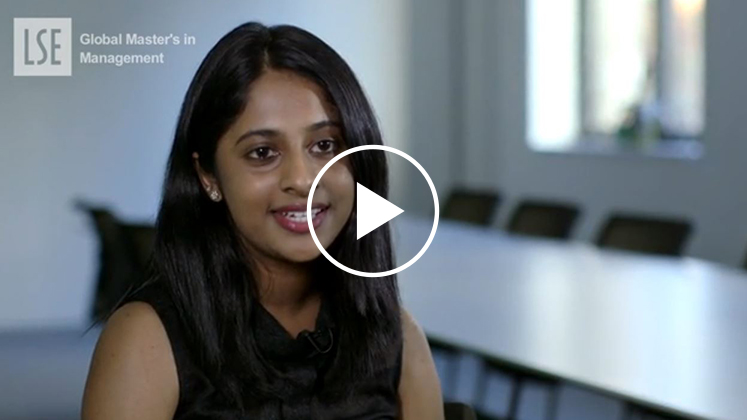 Join the top students from across the globe and prepare yourself for an outstanding career in management and leadership with our two year Global Master's in Management. We offer a unique approach to management, with a truly in-depth and rigorous learning experience. Alongside a foundation in the fundamental knowledge and skills essential for managers today, you will also have the opportunity to specialise and apply what you’ve learned in practice. An extensive first-year curriculum gives a clear understanding of the real challenges facing managers and organisations operating in a global context. After an optional summer internship spent exploring career options, we offer three second-year pathways to specialise and ground what you have learnt, complemented by two core courses, Management in Action and Ethics, Governance, and Leadership. We are proud to be the only UK programme to offer the CEMS double degree, with 34 leading partner business schools worldwide, and access to a global network of over 70 corporate partners and 8 social partners (NGOs). We also offer the MBA exchange term, giving an opportunity to join a leading MBA classroom in the US and Asia. Alternatively, you can opt to explore LSE’s huge range of electives, and specialise in your own area of interest; the choice is yours. Read more about the LSE student experience on our student blog, The Student Lens > Programme details
Entry requirementsEntry requirements for global master's in management.
Please note successful applicants will receive an offer for the two-year Global Master’s in Management. Switching to the one-year Master’s in Management will not be possible once you begin this programme at LSE. Therefore, please ensure you choose the programme you apply for carefully, as there will not be any opportunity to transfer. Assessing your applicationYour application will be considered on its academic merits. An offer of a place may be conditional on attending additional courses and/or passing qualifying examinations at a suitable standard, in addition to your degree. You should note that there are always many more applications than places available at LSE and possession of the minimum entrance requirements does not guarantee that you will be offered admission. It is therefore in your interests to apply as early as possible. We welcome applications from all suitably qualified prospective students and want to recruit students with the very best academic merit, potential and motivation, irrespective of their background. We carefully consider each application on an individual basis, taking into account all the information presented on your application form, including your: - academic achievement (including predicted and achieved grades) - statement of academic purpose (see requirements below) - two references - GMAT/GRE (where required) - CV See further information on supporting documents Academic statement of purpose requirementsWrite a short academic statement of purpose about why you want to do the programme. This might cover, for example, what you will bring to the cohort and what are your particular strengths. There is no fixed word limit, but we expect your statement to be between 1,000 - 1,500 words. Speak to an Admissions specialistIf you have any queries which are not answered on the website or would like to chat with an admissions specialist, we run 1:1 Zoom chats on a weekly basis for prospective students and offer holders: Book 1:1 session (prospective students) Book 1:1 session (offer holders) When to applyApplications for this programme are considered on a rolling basis, meaning the programme will close once it becomes full. There is no fixed deadline by which you need to apply, however, we encourage you to apply early to avoid disappointment. Please note that to be considered for any LSE funding opportunity, you must have submitted your application and all supporting documents by the funding deadline. See the fees and funding section below on this page for more details. Apply now > Programme structure and coursesCurriculum overview. We are ranked #3 in the world for social science and management , and the Global Master's in Management programme is founded in LSE’s tradition for academic excellence. A curriculum of carefully designed compulsory core courses will explore a variety of perspectives on markets and organisations drawn from various disciplines including economics, economic sociology, and business psychology. With this foundation, you will develop your critical and analytical skills to deal with all types of challenges facing managers today in the complex international business environment, from people management and cross-cultural working to strategic business innovation and responsible leadership. International optionsYou will gain a unique exposure to the socio-economic environment of real business throughout the programme, learning alongside a diverse cohort of classmates from around the world. You will gain perspectives on today's international business challenges in core courses and have the opportunity to consolidate your global business experience with our prestigious international options, the CEMS double degree and the MBA exchange term. Introductory courseIntroduction to studying for the Global Master's in Management (GMiM) Students are required to undertake an introductory course starting early September, before the beginning of the first academic term. This provides essential skills in maths for economics, quantitative analysis and writing which will be required throughout the programme. First year: foundationThis first year will provide an in-depth training in the core foundations of general management, covering the same topics as a traditional MBA programme, but taking a more critical and rigorous approach to those topics. Following Year 1, the summer vacation offers time to undertake an internship. Although not compulsory, it is strongly encouraged to help apply learning and gain practical experience. First year compulsory core courses: (* denotes a half unit) Foundations of Management I * and Foundations of Management II * Gives a basic grounding in the key management disciplines which will be taught chronologically. Students will therefore be provided with an overview of the development of management disciplines and will develop an understanding of the disciplinary anchors in sociology, psychology and economics. Managerial Economics * Provides an introduction to the central issues in managerial economics. This course will analyse the foundations for applying economic thinking to management. One of the following courses: a) Introduction to Quantitative Analysis * An intensive introduction to quantitative data analysis in the social sciences. The course is intended for students with no previous experience of quantitative methods or statistics. It covers the foundations of descriptive statistics and statistical estimation and inference. At the end of the course students should be able to carry out and interpret a range of univariate and bivariate data analysis techniques from univariate descriptives to multiple linear regression. The seminars and computer exercises give 'hands-on' training in the application of statistical techniques to real social science research problems using the R computer package (no prior knowledge of R is necessary). b) Intermediate Quantitative Analysis* The course is intended for students with some (even if limited) previous experience of quantitative methods or statistics. Using examples from psychological research, it covers first a review of the foundations of descriptive statistics and statistical inference, in the context of the analysis of two-way contingency tables and comparisons of means between two groups. The main topic of the course is linear regression modelling and related methods, including scatterplots, correlation, simple and multiple linear regression, and analysis of variance and covariance. An introduction to binary logistic regression modelling is also included. The computer classes give hands-on training in the application of these statistical techniques. c) Applied Regression Analysis * The course is designed for students with a good working knowledge of elementary descriptive statistics; sampling distributions; one and two sample tests for means and proportions; correlation and the linear regression model with one or more predictor variables. The course is concerned with deepening the understanding of the generalized linear model and its application to social science data. The main topics covered are linear regression modelling and binary, multinomial and ordinal logistic regression. Marketing Management * Provides a rigorous examination of the key analytical frameworks, technical tools, and concepts that are essential in building an effective marketing strategy. Students exempted from taking Marketing Management will be free to take one elective course* , subject to the approval of the Programme Director. Organisational Behaviour and Leadership * Seeks to understand individual attitudes and behaviour in an organisational context. Students will review psychological theories as they apply to organisations, demonstrating the contribution of a psychological perspective to understanding human behaviour at work, and critically evaluating the empirical evidence. Students exempted from taking Organisation Behaviour will be free to take one elective course* , subject to the approval of the Programme Director. GMiM Capstone Course - Management in Action - (non-assessed) The first part of a course that runs throughout both years of the Global Master's in Management programme, and builds connections between management theory and practice to equip students with the skills necessary to succeed in their managerial careers. Second year: concentrationSecond year compulsory core courses: Foundations of Management III: Business Ethics and Corporate Social Responsibility * Provides a critical understanding of the key ideas in business ethics, corporate governance and leadership. The courses introduces historical and theoretical approaches to prepare students for future leadership roles in global organisations. GMiM Capstone Course - Management in Action (including Business Project) * Builds connections between management theory and practice to equip students with the skills necessary to succeed in their managerial careers. Students apply the theoretical knowledge and business management skills gained in the first year by working on a business project with an external client. Teams of students work with a sponsor company over the course of a term to develop a solution to a real business problem. Management Dissertation* For students studying on the LSE track in year 2 only. Provides students with the opportunity to conduct independent research in a topic of their choice. Research questions are agreed with assigned dissertation supervisors in year 2. Building on the core foundation from Year 1, Year 2 will provide the opportunity to develop concentrated knowledge and experience in your own field of interest, according to your career goals. You will have the option to concentrate your learning in global management with either:
Companies who have sponsored business project in the past include: AstraZeneca; Barclays; Benchmark Sport; Coca Cola; Daymon; Ecofact; Deloitte; Google; Heidrick and Struggles; HSBC; Markit; Mars; Merlin Entertainment; Morgan Stanley; MYBA; Nokia; Oliver Wyman; PwC; Studio Canal; Tesco, and Thomson Reuters. Students can also undertake the international CEMS or MBA exchange options in year 2. For CEMS students, additional core courses will be included in year 2. If you choose to remain at LSE in your second year, you will have access to a wide range of specialised elective courses from departments across our leading social science institution, ranging from finance to psychological and behavioural science. (See the full list of specialised electives ). You may choose to concentrate your electives in a certain topic area, which would be recognised in the degree title you are awarded with. You can find the most up-to-date list of elective titles courses in the Programme Regulations section of the current School Calendar. Optional elective coursesYou can tailor the programme to your own interests and specialise your knowledge with optional elective courses. Extended Essay * For students studying on the CEMS Master's in International Management double degree and the MBA exchange only . An individual extended essay based on a research question which students are required to agree with the teacher responsible during Winter Term in Year 2. Any of the elective courses listed may be taken, subject to pre-requisites and course availability, by any GMiM student. However, students who wish to have a concentration recognised on their degree certificate should choose from within the appropriate sub-list the number of courses that will satisfy the unit requirement for that concentration. The following concentrations are available: Accounting and Finance; Accounting; Finance; Human Resource Management; Information Systems and Digital Business; Marketing and Consumer Behaviour; Strategy and International Business. Please note: If you choose to undertake the CEMS or MBA exchange options in year 2, the number of LSE electives will be reduced to accommodate a term abroad, plus additional courses for CEMS. For the most up-to-date list of optional courses please visit the relevant School Calendar page . You must note, however, that while care has been taken to ensure that this information is up to date and correct, a change of circumstances since publication may cause the School to change, suspend or withdraw a course or programme of study, or change the fees that apply to it. The School will always notify the affected parties as early as practicably possible and propose any viable and relevant alternative options. Note that the School will neither be liable for information that after publication becomes inaccurate or irrelevant, nor for changing, suspending or withdrawing a course or programme of study due to events outside of its control, which includes but is not limited to a lack of demand for a course or programme of study, industrial action, fire, flood or other environmental or physical damage to premises. You must also note that places are limited on some courses and/or subject to specific entry requirements. The School cannot therefore guarantee you a place. Please note that changes to programmes and courses can sometimes occur after you have accepted your offer of a place. These changes are normally made in light of developments in the discipline or path-breaking research, or on the basis of student feedback. Changes can take the form of altered course content, teaching formats or assessment modes. Any such changes are intended to enhance the student learning experience. You should visit the School’s Calendar , or contact the relevant academic department, for information on the availability and/or content of courses and programmes of study. Certain substantive changes will be listed on the updated graduate course and programme information page. CEMS double degree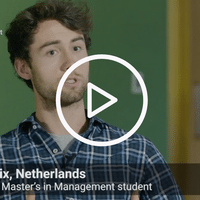 CEMS is a global alliance of leading business schools in 34 countries, partnering with multinational companies and NGOs to offer the prestigious CEMS Master’s in International Management degree programme . LSE is the only UK member school in the CEMS Alliance, and we are proud that the LSE Global Master's in Management is the only programme in the UK to offer the CEMS Master’s in International Management (CEMS MIM) as a double degree. The CEMS Master's in International Management programme at LSEThe CEMS MIM is a one-year programme which LSE Global Master's in Management students have the opportunity to join in their second year of study. The programme gives a unique opportunity to join a cohort of high calibre, internationally minded, multilingual students enrolled at leading business schools across the world. The programme takes a focus on global citizenship, with a particular emphasis on ethical standards, cultural diversity, respect and empathy, and responsibility and accountability to society. During the CEMS year (Year 2 of the LSE GMiM), students will enjoy an international exchange term at a leading CEMS school, along with exclusive CEMS core courses in Global Management, skills seminars, block seminars, and an international internship. You will graduate from both the LSE GMiM degree, and from the CEMS Master’s in International Management degree, giving you a double degree qualification. CEMS has a genuine ethos of community at its heart, and joining the programme gives students lifelong access to a strong and active global network of likeminded peers and friends across the world. In addition, the CEMS offers an unrivalled professional network with unique access to job opportunities and connections with top employers worldwide. CEMS graduates are highly sought after by employers around the world, and are regularly recruited by CEMS corporate and social partners. Full details of the CEMS curriculum and activities can be found in our CEMS Information Sheet . Selection process and entry requirementsStudents can apply for the CEMS programme in October/November of the first year in the LSE GMiM programme, and will be accepted via an interview process. Students must meet the CEMS entry requirements below in order to apply. Over 99% of students who choose to apply will be offered a place on CEMS, and individual support is provided at every stage of the application and interview process to ensure students are fully prepared to meet the requirements. Note: applicants are unable to have their exchange term abroad take place in their country of origin. CEMS entry requirements:
Note: The language of instruction at all the CEMS schools is English. Students are not required to speak the language of the country of their term abroad school. MBA exchange term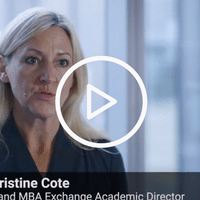 Students can apply to spend a term abroad in their second year of the LSE Global Master’s in Management at one of 10 leading partner business schools in the US and Asia. Students will join an MBA class at their chosen school, and take a choice of optional elective courses offered by the school. The exchange term provides an opportunity for students to immerse themselves in an environment that differs from LSE both culturally and academically, by joining a programme that applies a more practice-based approach to learning. The exchange term provides a contrast to the more academically theoretical programme at LSE, and the chance to specialise in international management with a wider breadth of international knowledge and experience. Exchange partner schools
Students can apply for the MBA exchange term in January of the first year in the LSE GMiM programme, and will be accepted via an interview process assessing the following competencies and aptitudes:
Note: applicants are unable to have their exchange term abroad take place in their country of origin. Students must have a minimum of 12 months’ previous work experience in order to apply, as they will be joining an MBA classroom. This requirement reflects the fact that LSE students participating in an exchange program with a US school will be studying alongside students with substantial work experience and in an environment which encourages very active participation and sharing of this experience. The 12-month work experience should take place during or after university undergraduate study and can consist of either one consecutive year or comprised of an accumulation of work experience or paid internships, each with at least an 8 week duration. Students applying for the MBA exchange must demonstrate to the GMiM programme office that they meet the relevant work experience requirement through a certification process taking place in October/November of the first year of the GMiM programme. Once this has been certified, students will be permitted to apply. Applications will be due in October/November during your first year on the programme. Over 99 percent of students who choose to apply will be offered a place on the MBA exchange term, and individual support is provided at every stage of the application and interview process to ensure students are fully prepared to meet the requirements. Teaching and assessmentThe lse learning experience. The curriculum is designed to challenge your view of the world, and of management as a discipline. You will be asked to read the latest research to understand the underlying reasons why today’s business world exists as it does, and the practical implications for your future career as a manager. You will critically assess trends, conflicts and patterns in management and business practice, and form your own opinions to defend and debate with your classmates in seminars. You will learn how to develop and communicate well-reasoned arguments, and to tackle complex decisions and problems in the context of the real socioeconomic and geo-political architecture in which businesses operate across the globe. Courses are taught in lecture and class or seminar format. Lectures introduce the core theoretical and technical concepts whilst their associated classes allow students to discuss and apply these concepts through exercises and in-depth study. Seminars allow for the focused study of key concepts in a more informal style and often involve presentations by students on selected course materials. Many teachers adopt a variety of teaching methods to deliver their courses such as class exercises, team presentations, individual or group work, or case study discussions. Given the high level of academic performance expected from students, a significant amount of independent study and preparation is required to get the most out of the programme. All full-unit courses are assessed by three hour unseen examinations in the Spring Term. Half-unit courses can be assessed by two hour unseen examinations, coursework assignments, class participation or group/individual project work. You can view indicative details of hours and assessment for all courses listed in the online Programme Regulations .  Academic supportYou will also be assigned an academic mentor who will be available for guidance and advice on academic or personal concerns. There are many opportunities to extend your learning outside the classroom and complement your academic studies at LSE. LSE LIFE is the School’s centre for academic, personal and professional development. Some of the services on offer include: guidance and hands-on practice of the key skills you will need to do well at LSE: effective reading, academic writing and critical thinking; workshops related to how to adapt to new or difficult situations, including development of skills for leadership, study/work/life balance and preparing for the world of work; and advice and practice on working in study groups and on cross-cultural communication and teamwork. LSE is committed to enabling all students to achieve their full potential and the School’s Disability and Wellbeing Service provides a free, confidential service to all LSE students and is a first point of contact for all disabled students. Programme Director CEMS and MBA Exchange Academic Director Career development with the Global Master's in Management LSE is ranked #5 in the world for its reputation with employers , and our graduates are in high demand by employers. The Global Master's in Management programme will develop your intellectual and practical skills as a talented and well-rounded manager, with the ability to thrive and innovate with challenges in today’s complex and fast-moving business world. With a strong foundation in the core pillars of management developed in Year 1 of the programme, to match with other top business school graduates, plus your own additional chosen specialism in Year 2, you will graduate with a unique and well-rounded portfolio of skills and knowledge to set you apart in the job market. Your practical and professional management skills will be developed and polished during the programme, including communication and presentation skills, team working, cultural intelligence gained from close collaboration with classmates from around the world, and client management experience from a practical business project in the Capstone Course. LSE CareersLSE Careers will provide tailored individual support with your professional development and job search throughout the programme. They offer one-to-one Career Consultant sessions, access to employers with career fairs, seminars and workshops, a vast database of employment opportunities via the LSE Career Hub, and help with job hunting, CVs/resumes and interviews. Graduate destinationsOur graduates are in high demand by employers, and GMiM graduates have taken roles across a wide variety of sectors, in companies across the globe. A popular career path is management consulting, with graduates taking up roles in firms such as BCG, EY, Deloitte, KPMG, McKinsey and Accenture. However opportunities are extremely broad, and MiM graduates have also gone on to excel in careers in finance, marketing, advertising, communications, and start-ups, as well as third-sector charities and NGOs. Here are some examples of the organisations our graduates have joined:
Student storiesStudent profiles, marnix, netherlands.  Payal, India 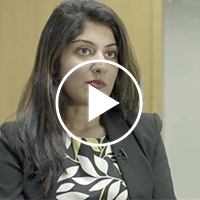 Vineet, India 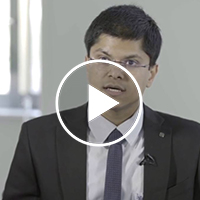 Yiming, China  Class profileThe Global Master's in Management programme attracts a diverse range of students, and each year we carefully select a vibrant cohort from a wide variety of backgrounds and international locations. A core part of the learning experience is the exposure to a wide variety of cultures and international perspectives, as well as diverse expertise from our students’ wide ranging academic and employment backgrounds. The programme is well suited to both early-career graduates and mid-career professionals with experience to share. Read more about the LSE student experience on our student blog, The Student Lens > Fees and fundingEvery graduate student is charged a fee for their programme. The fee covers registration and examination fees payable to the School, lectures, classes and individual supervision, lectures given at other colleges under intercollegiate arrangements and, under current arrangements, membership of the Students' Union. It does not cover living costs or travel or fieldwork. Tuition fees 2024/25 for Global Master's in ManagementHome students, first year: £36,472 (2024/25) Overseas students, first year: £37,168 (2024/25) Home students, second year: £36,888 (2025/26) - provisional Overseas students, second year: £37,608 (2025/26) - provisional The Table of Fees shows the latest tuition amounts for all programmes offered by the School. The amount of tuition fees you will need to pay, and any financial support you are eligible for, will depend on whether you are classified as a home or overseas student, otherwise known as your fee status. LSE assesses your fee status based on guidelines provided by the Department of Education. Further information about fee status classification. To secure a place on the programme offer holders will be required to pay a deposit of 10% of the tuition fee within six weeks of receiving their offer. Detailed guidance, including details around exceptions, will be made available from December 2023 . Fee reductionStudents who completed undergraduate study at LSE and are beginning taught graduate study at the School are eligible for a fee reduction of around 10 per cent of the fee. Scholarships and other fundingThe School recognises that the cost of living in London may be higher than in your home town or country, and we provide generous scholarships each year to home and overseas students. This programme is eligible for needs-based awards from LSE, including the Graduate Support Scheme , Master's Awards , and Anniversary Scholarships . Selection for any funding opportunity is based on receipt of an application for a place – including all ancillary documents, before the funding deadline. Funding deadline for needs-based awards from LSE: 25 April 2024 . In addition to our needs-based awards, LSE also makes available scholarships for students from specific regions of the world and awards for students studying specific subject areas. Find out more about financial support. Government tuition fee loans and external fundingA postgraduate loan is available from the UK government for eligible students studying for a first master’s programme, to help with fees and living costs. Some other governments and organisations also offer tuition fee loan schemes. Find out more about tuition fee loans Further informationFees and funding opportunities Programme and admissions enquiriesWith questions related to your application or the admissions process, please check our admissions frequently asked questions page. If you have any queries which are not answered on the website, please contact the Programme and Admissions Team: Email: [email protected] How to apply Download our MSc brochure Related ProgrammesMaster's in management. Code(s) N2UB MSc MarketingCode(s) N5U1 MSc Economics and ManagementCode(s) N2U5 Request a prospectus
Register your interestSpeak to admissions. Content to be supplied Browser does not support script.  MPhil/PhD ProgrammesResearch training to enhance your career in global health. Research programmes are designed to produce professional social scientists well versed in a range of social science techniques and methods, in addition to having an in-depth knowledge of a particular area in global health. A PhD offers the chance to undertake a substantial piece of supervised work that is worthy of publication and which makes an original contribution to knowledge in a particular field. Research programmes (leading to a PhD) are designed to produce professional social scientists well versed in a range of social science techniques and methods, in addition to having an in-depth knowledge of a particular area in global health. Students studying for a PhD are required to carry out research (both from documents and in the field) and collect data from which they must write a thesis of approximately 100,000 words. Students in some departments may be permitted to submit a final thesis by a series of papers, with a linking introduction and conclusion. In addition, all students will normally be required to attend certain taught courses. More information is available here . The information on this page summarises the Research programmes LSE offers with relation to global health. Programmes are organised within the host Department. If you are interested in applying, you are encouraged to contact the Departments directly for more information. In some cases, you may be required to attend an interview if your application is shortlisted . Research programmes offered in the 2021/2022 academic year: Department of Health PolicyThe MPhil/PhD programme in Health Policy and Health Economics is an integral part of the academic environment at LSE, producing doctoral graduates of the highest quality. The programme draws upon multidisciplinary perspectives, notably from economics, social policy, and public policy. As a student on this programme you will be equipped with the critical, conceptual, and analytical skills to understand the key theoretical frameworks and analytical methods to undertake high-quality research. More details here Department of Gender StudiesThe MPhil/PhD Programme aims to foster your scholarly and career interests and to prepare you for the world of academic and policy research in the form of courses, workshops, and professional training experience over your first three years. You will receive core gender theory, epistemology and methodology training in your first year to prepare you for research and writing, and ongoing training across the period of your studies in and outside the Department. You will also attend fortnightly PhD workshops throughout the programme in years 1 to 3. You will be ‘matched’ with your main Supervisor who will guide you through the various stages of your research and form the consistent point of contact during your time in the Department, along with the Director of the Doctoral Programme. More details here Department of Geography and EnvironmentThe PhD in Environmental Policy and Development aims to provide a rigorous, research-based approach to the social scientific study of environmental change and development. The doctoral programme provides you with advanced and up-to-date teaching in environmental governance and development studies as well as tailored research skills training. Moreover, the doctoral experience at LSE exposes you to an international, vibrant and multidisciplinary research environment. The programme is run by the Environmental Economics and Policy cluster of the Department of Geography and Environment. The cluster brings together experts in environmental change, geography, political science and economics, with an interest in advancing empirical understanding and in the theory of environmental performance, behaviour and governance across a range of geographic scales. More details here Department of International DevelopmentThe MRes/PhD in International Development is a one-year research Master's linked to a four-year PhD. The programme grounds students in a common academic heritage while providing them with significant flexibility appropriate to their research interests. Students are equipped with advanced methodological and theoretical skills within disciplinary specialisms, with the aim of producing graduates who go on to be excellent, well-rounded and intensively trained social scientists. To this end, the first year of the programme combines intensive coursework (through taught courses) with research design (preparation of a 10,000 word research proposal). This proposal forms the basis of the student's subsequent PhD research. More details here Department of Social PolicyThe MPhil/PhD programmes in Social Policy and Demography aim to provide research students with the skills and competencies to undertake a substantial piece of work that is of publishable quality and which makes an original contribution to the broad field of either Social Policy or Demography. In the first year students follow a compulsory seminar course (covering the MPhil/PhD process, ethics, risks, research skills etc.). They must also present their work to fellow students and staff, prior to updgrade to PhD status which follows a formal assessment of their proposed doctoral research. Students may attend courses in the Methodology Department. There is also a seminar course for second and third year students; the key element of this involves third year PhD students presenting their work to fellow students and staff in advance of submitting their Third Year Review. More details here Department of SociologyThe MPhil/PhD Sociology programme offers you the chance to undertake a substantial piece of work that is worthy of publication and which makes an original contribution to sociology. You will begin on the MPhil, and will need to meet certain requirements to be upgraded to PhD status. LSE Sociology embraces a theoretically and methodologically diverse range of approaches. There are four research areas which constitute our strategic priorities and reflect overall a balance between "traditional" sociology and "innovation": economy, technology and expertise; politics and human rights; social inequalities; and urban sociology. More details here More information on funding and studentships are available here . The PhD Academy is a dedicated space and services hub for doctoral candidates studying at LSE. Current students are enouraged to contact the PhD Academy for any further queries.  Peer Review Reading Group Review your research manuscript prior to publication Global Health at LSE Blog Read the latest global health blogs | ||||||||||||||||||||||||
IMAGES
VIDEO
COMMENTS
Faber, Benjamin (2013) Three essays on globalization and economic development. PhD thesis, London School of Economics and Political Science. Preview.
The first part of this dissertation comprises two chapters that explore the variation induced by the expansion of the copper industry in Chile, the largest copper producer, during the commodity price boom in the 2000s. The first chapter examines the heterogeneous economic impacts between multinational companies and domestic firms on the ...
Welcome to LSE Theses Online, the online archive of PhD theses for the London School of Economics and Political Science. LSE Theses Online contains a partial collection of completed and examined PhD theses from doctoral candidates who have studied at LSE. Please note that not all print PhD theses have been digitised.
Research Design and Dissertation in International Development. The DV410 dissertation is a major component of the MSc programme and an important part of the learning and development process involved in postgraduate education. The objective of DV410 is to provide students with an overview of the resources available to them to research and write ...
This thesis argues that the emergence of the global city phenomenon is an important indication of broader transformative tendencies in the contemporary international system. It also argues that International Relations as a discipline offers a unique set of theoretical resources that can help analysts draw out the wider impact of the global city ...
This thesis consists of three chapters, in which I study the role of globalization and how political views are formed. The first chapter studies the rise of backlash against tourism as a form of antiglobalization sentiment, looking at the role of Airbnb. I construct a spatially disaggregated dataset to study the consequences of Airbnb in London.
Pellerin, Camille Louise (2018) The politics of public silence: civil society - state relations under the EPRDF regime. PhD thesis, London School of Economics and Political Science. Priyadarshi, Praveen Kumar (2018) Political determinants of municipal capacity: a study of urban reforms in Ahmedabad and Kanpur, India.
PhD thesis, London School of Economics and Political Science. Majinge, Charles Riziki (2013) The United Nations, the African Union and the rule of law in Southern Sudan. PhD thesis, London School of Economics and Political Science. Gallo, Zelia (2013) The penality of politics, penality in contemporary Italy 1970-2000.
MSc Gender, Development and Globalisation. This distinctive interdisciplinary programme focuses on integrating the theoretical analysis of gender with questions of globalisation and development. The programme aims to provide a firm understanding of economic and social processes that shape the contemporary global world and their gendered outcomes.
LSE Law, Society and Economy Working Papers 3/2012 London School of Economics and Political Science Law Department. ... Internet, which has made virtually instantaneous global communication possible.1 This extends not only to the pure processing and communication of information,
LSE is an international community, with over 140 nationalities represented amongst its student body. ... LSE uses a range of formative assessment, such as essays, problem sets, case studies, reports, quizzes, mock exams and many others. ... This degree is designed for students who have a passion for global history explored from the perspective ...
These MSc dissertations have been selected by the editor and deputy editor of the Media@LSE Working Paper Series and consequently, are not the responsibility of the Working Paper Series Editorial Board. 2022-23. No 313 The App Keeps the Score: Period-Tracking Apps, Self-Empowerment and the Self as Enterprise, Martina Sardelli.
This essay delves into the complexities of the Great Divergence, Eurocentrism, and the longue durée to explore why China fell behind Western Europe as a nodal point for global power. While some scholars ascribe Europe's rise solely to factors like accessible English coal and the plunder of colonies and the New World, this essay argues against this Eurocentric view. Instead, it focuses on ...
Prize winning MSc dissertations. Master's students undertake a dissertation as part of all our MSc programmes, allowing them to further develop their research in areas of interest. Each year a prize is awarded to the dissertation with distinction that receives the highest mark across each of our MSc programmes.
In Seven Crashes: The Economic Crises that Shaped Globalization, Harold James explores major market crashes from the last 170 years, examining their causes (whether they were demand or supply crashes) and their impacts on globalisation. In Kyle Scott's view, the book shares valuable, engaging analysis of these economic crises, though its apparent aim to appeal to both general and specialist ...
On the first day of 2021, African countries began the new year by officially trading under the AfCFTA, after delays due to the pandemic. The AfCFTA, which unites 54 of the 55 members of the African Union, entered into force on May 30, 2019 creating the largest trade bloc in the world uniting 1.3 billion people in a $3.4 trillion economic bloc ...
Regardless of topic, your dissertation should demonstrate the following skills: Defining and outlining a research topic. Defining a clear research question. Identifying salient issues. Finding or generating relevant information. Evaluating the information's reliability and validity.
A research project has many stages and the end product - a dissertation - is a major piece of writing. There's a lot to think about, but LSE LIFE can help you find your way with resources, events, and one-to-one advice at every step of the way! We're open and doing things every weekday, throughout the whole academic year and summer break, until ...
PHD THESIS SUBMISSION FORM FOR LSE THESES ONLINE . Context . LSE is committed to the principle of free availability of research degree theses through LSE Library via . LSE Theses Online, as well as the British Library through the EThOS Service. Making PhD theses open access ensures a worldwide audience for your work, leading to
Curriculum overview. We are ranked #3 in the world for social science and management, and the Global Master's in Management programme is founded in LSE's tradition for academic excellence.A curriculum of carefully designed compulsory core courses will explore a variety of perspectives on markets and organisations drawn from various disciplines including economics, economic sociology, and ...
access of the top LSE downloaded thesis yielded a little further information: this thesis appears on an international relations theory website and is cited in many foreign Masters theses, which probably accounts for its popularity. Figure 4 digs deeper into the download/citation relationship, by examining the LSE theses with a strong (at
Department of Gender Studies. The MPhil/PhD Programme aims to foster your scholarly and career interests and to prepare you for the world of academic and policy research in the form of courses, workshops, and professional training experience over your first three years. You will receive core gender theory, epistemology and methodology training ...
The LSE-Gaddafi affair was a scandal in the United Kingdom that occurred as a result of relationship that existed between the London School of Economics (LSE) and the Libyan government and its leader Muammar Gaddafi and his son Saif al-Islam Gaddafi.. The NGO Gaddafi Foundation pledged to donate £1.5 million over five years to a research centre, LSE Global Governance, of which £300k were paid.